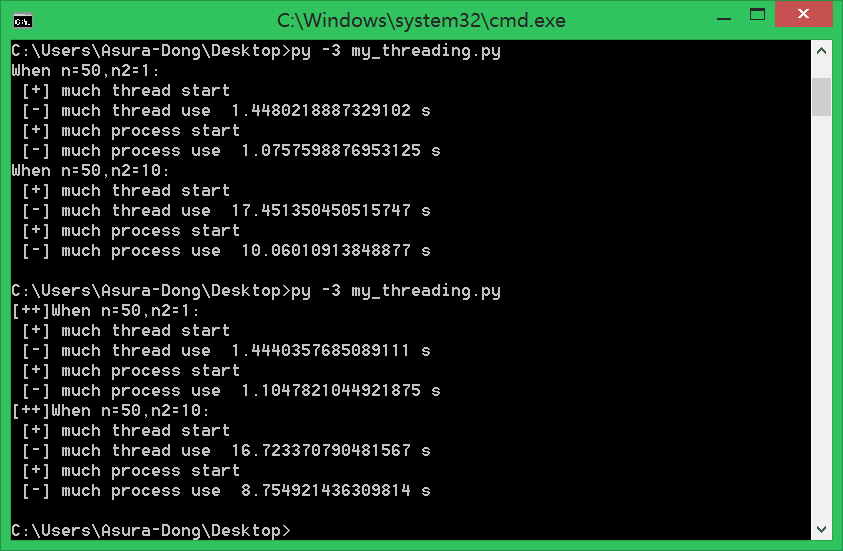python3.6
threading和multiprocessing
四核+三星250G-850-SSD
自從用多進程和多線程進行編程,一致沒搞懂到底誰更快。網上很多都說python多進程更快,因為GIL(全局解釋器鎖)。但是我在寫代碼的時候,測試時間卻是多線程更快,所以這到底是怎么回事?最近再做分詞工作,原來的代碼速度太慢,想提速,所以來探求一下有效方法(文末有代碼和效果圖)
這里先來一張程序的結果圖,說明線程和進程誰更快

一些定義
并行是指兩個或者多個事件在同一時刻發生。并發是指兩個或多個事件在同一時間間隔內發生
線程是操作系統能夠進行運算調度的最小單位。它被包含在進程之中,是進程中的實際運作單位。一個程序的執行實例就是一個進程。
實現過程
而python里面的多線程顯然得拿到GIL,執行code,最后釋放GIL。所以由于GIL,多線程的時候拿不到,實際上,它是并發實現,即多個事件,在同一時間間隔內發生。
但進程有獨立GIL,所以可以并行實現。因此,針對多核CPU,理論上采用多進程更能有效利用資源。
現實問題
在網上的教程里面,經常能見到python多線程的身影。比如網絡爬蟲的教程、端口掃描的教程。
這里拿端口掃描來說,大家可以用多進程實現下面的腳本,會發現python多進程更快。那么不就是和我們分析相悖了嗎?
import sys,threadingfrom socket import *host = "127.0.0.1" if len(sys.argv)==1 else sys.argv[1]portList = [i for i in range(1,1000)]scanList = []lock = threading.Lock()print('Please waiting... From ',host)def scanPort(port): try: tcp = socket(AF_INET,SOCK_STREAM) tcp.connect((host,port)) except: pass else: if lock.acquire(): print('[+]port',port,'open') lock.release() finally: tcp.close()for p in portList: t = threading.Thread(target=scanPort,args=(p,)) scanList.append(t)for i in range(len(portList)): scanList[i].start()for i in range(len(portList)): scanList[i].join()誰更快
因為python鎖的問題,線程進行鎖競爭、切換線程,會消耗資源。所以,大膽猜測一下:
在CPU密集型任務下,多進程更快,或者說效果更好;而IO密集型,多線程能有效提高效率。
大家看一下下面的代碼:
import timeimport threadingimport multiprocessingmax_process = 4max_thread = max_processdef fun(n,n2): #cpu密集型 for i in range(0,n): for j in range(0,(int)(n*n*n*n2)): t = i*jdef thread_main(n2): thread_list = [] for i in range(0,max_thread): t = threading.Thread(target=fun,args=(50,n2)) thread_list.append(t) start = time.time() print(' [+] much thread start') for i in thread_list: i.start() for i in thread_list: i.join() print(' [-] much thread use ',time.time()-start,'s')def process_main(n2): p = multiprocessing.Pool(max_process) for i in range(0,max_process): p.apply_async(func = fun,args=(50,n2)) start = time.time() print(' [+] much process start') p.close()#關閉進程池 p.join()#等待所有子進程完畢 print(' [-] much process use ',time.time()-start,'s')if __name__=='__main__': print("[++]When n=50,n2=0.1:") thread_main(0.1) process_main(0.1) print("[++]When n=50,n2=1:") thread_main(1) process_main(1) print("[++]When n=50,n2=10:") thread_main(10) process_main(10)
新聞熱點
疑難解答